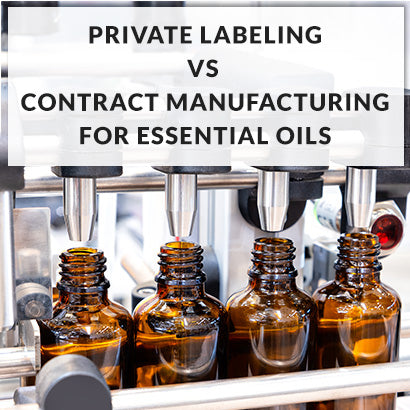
In the world of essential oils, two primary manufacturing options often stand out: private label and contract manufacturing. Understanding the details of these methods is crucial for those entering the essential oils industry. In this blog, we will discuss the core concepts - private label and contract manufacturing - as well as related terms like private labeling, contract manufacturing for natural essential oils, private label of essential oils, and essential oils manufacturing. Our aim is to provide you with a comprehensive understanding of these approaches to help you make informed decisions for your essential oils business.
Private Label: Putting Your Brand on Existing Products.
Private label refers to a business strategy where you choose pre-made essential oil products from a manufacturer and then attach your own brand name to those products. In other words, you're essentially reselling products made by someone else but marketing them as your own.
Here are some advantages of Private Label.
- Quick Market Entry: With private label essential oils, you can swiftly enter the market without the time-consuming tasks of formulation, manufacturing, and packaging.
- Cost-Effectiveness: Private label manufacturing often provides a cost-effective solution, enabling businesses of all sizes to offer competitively priced products without compromising quality.
- Streamlined Operations: By outsourcing production, you can focus your efforts on marketing, brand development, and expansion while the manufacturer handles the product's creation.
Contract Manufacturing: Crafting Unique Essential Oils
In contrast, contract manufacturing for essential oils involves comprehensive control and customization throughout the entire production process. This approach allows you to create bespoke essential oil blends and control every aspect of the product:
Let’s look at the advantages of being the manufacturer.
- Tailored Products:: Contract manufacturing empowers businesses to formulate unique essential oil blends, design custom packaging, and create distinct labels, giving you a product that aligns precisely with your brand.
- Quality Assurance: By overseeing the manufacturing process, you can maintain rigorous quality control, ensuring that your essential oils consistently meet your high standards.
- Market Adaptability: The flexibility of contract manufacturing enables you to swiftly respond to evolving market trends, keeping your product offerings in sync with consumer preferences.
Private Label vs. Contract Manufacturing: Making the Decision
The choice between private label and contract manufacturing depends on your business's specific goals and needs.
Private label is an excellent option for those seeking simplicity, speed, and cost-efficiency, making it ideal for a hassle-free market entry.
Contract manufacturing is the right choice for businesses aiming to create unique, customizable products, maintain stringent quality control, and adapt to changing market dynamics.
Conclusion
In the world of essential oils, the decision between private label and contract manufacturing is pivotal. Whether you choose the ease of private labeling or the customization of contract manufacturing, the end goal is the same: delivering high-quality essential oils that resonate with consumers. As you embark on your journey in the essential oils industry, consider your objectives, resources, and target market to make an informed decision that aligns with your brand's vision. By understanding the nuances of private label and contract manufacturing, you can navigate this thriving industry successfully.

